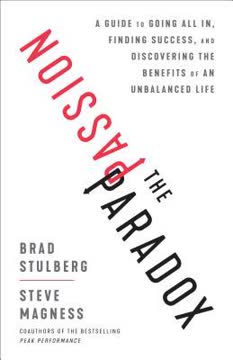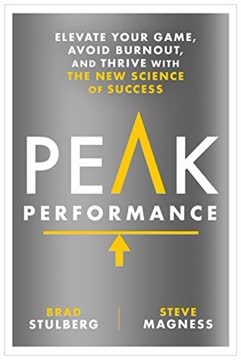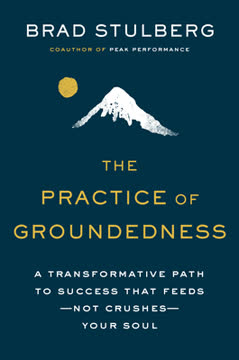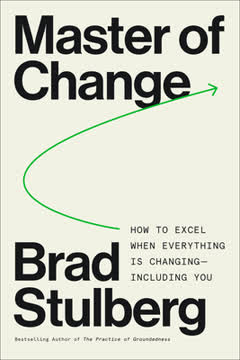Key Takeaways
1. Passion is a double-edged sword, requiring careful management.
Passion is fragile, and it must be handled with care.
Good and bad passion. Passion, while often celebrated, can lead to negative outcomes like burnout, regret, and loss of joy if not managed proactively. The key is to cultivate a healthy relationship with passion, ensuring it enhances rather than consumes your life.
Potential pitfalls. Unchecked passion can manifest in several destructive ways:
- Becoming a slave to external validation and results.
- Neglecting relationships, health, and other important aspects of life.
- Burning out due to unsustainable levels of effort.
- Losing the initial joy that fueled the passion.
Proactive management. To harness passion's positive power, it's crucial to develop self-awareness and implement strategies to prevent it from veering off course. This involves prioritizing internal satisfaction over external rewards and maintaining a balanced perspective.
2. Passion's roots lie in both suffering and love, fueled by dopamine.
We don’t get hooked on the feeling associated with achievement, we get hooked on the feeling associated with the chase.
Historical context. The word "passion" originally meant suffering, evolving over time to encompass love and desire. This historical connection highlights the intensity and potential for both positive and negative experiences associated with passion.
Biological basis. Passion is fueled by dopamine, a neurochemical that drives motivation and focuses attention. This creates a cycle of desire and pursuit, often leading to a ceaseless yearning for more.
Psychological influences. Past traumas and insecurities can also fuel passion, serving as a means of proving oneself or escaping from inner struggles. This connection between passion and suffering underscores the need for self-awareness and healthy coping mechanisms.
3. Find passion by exploring interests and satisfying basic needs.
A better approach to finding your passion is to lower the bar from perfect to interesting, then give yourself permission to pursue your interests with an open mind.
Fit vs. growth mindset. A "fit mindset" assumes passion comes from finding the perfect match, while a "growth mindset" emphasizes developing passion through exploration and effort. The latter is more conducive to long-term fulfillment.
Three basic needs. Self-determination theory posits that enduring motivation stems from satisfying three fundamental needs:
- Competence: Feeling capable and making progress.
- Autonomy: Acting in alignment with one's values and beliefs.
- Relatedness: Connecting with others and being part of something larger.
Overcoming resistance. Don't let "I couldn't possibly do this" syndrome prevent you from exploring new interests. Embrace curiosity and give yourself permission to pursue activities that capture your attention, even if they seem unconventional.
4. Cultivate passion incrementally, balancing "must" and "should."
The best route to making your passion a bigger part of your life is often not to choose must over should, but rather to choose must and should.
Hybrid approach. Instead of quitting your day job to pursue your passion, consider a "barbell strategy" that balances stability with risk. This involves maintaining a secure foundation while gradually increasing your investment in your passion.
Benefits of incremental growth. Pursuing passion incrementally reduces pressure, allows for experimentation, and increases the chances of long-term success. It also provides a safety net in case of setbacks or failures.
Faith and commitment. Eventually, you may reach a point where you're ready to go "all in" on your passion. This requires a leap of faith, but one that is grounded in evidence of your capabilities and a clear understanding of the sacrifices involved.
5. Obsessive passion leads to unethical behavior and burnout.
Being passionate about—or, perhaps better put, a slave to—the achievement of an external result that you cannot control creates a volatile and fragile sense of self-worth.
External validation. Obsessive passion is characterized by a focus on external rewards and validation, rather than the intrinsic joy of the activity itself. This can lead to a fragile sense of self-worth and a relentless pursuit of more.
Negative consequences. Obsessive passion is linked to unethical behavior, anxiety, depression, and burnout. It can also erode relationships and overall life satisfaction.
Hedonic adaptation. The pursuit of external rewards often leads to hedonic adaptation, where we quickly adapt to new levels of success and constantly crave more. This creates a cycle of dissatisfaction and suffering.
6. Harmonious passion stems from a mastery mindset and internal drive.
Those who focus most on success are least likely to achieve it. Those who focus least on success, and focus on the process of engaging in their craft instead, are most likely to achieve it.
Mastery mindset. Harmonious passion is cultivated through a mastery mindset, which emphasizes internal motivation, process-orientation, and continuous improvement. This mindset fosters a healthy and sustainable relationship with passion.
Key principles. The mastery mindset encompasses several key principles:
- Driving from within: Focusing on intrinsic motivation rather than external rewards.
- Focusing on the process: Emphasizing the journey rather than the destination.
- Striving for improvement: Prioritizing growth over being the best.
- Embracing failure: Viewing setbacks as opportunities for learning.
- Practicing patience: Recognizing that mastery takes time and commitment.
- Being present: Fully engaging in the activity at hand.
Benefits of harmonious passion. Harmonious passion is associated with enhanced vitality, emotional engagement, learning, performance, and overall life satisfaction. It allows you to experience a deep sense of fulfillment and purpose.
7. Balance is an illusion; self-awareness is key to a fulfilling life.
Living with passion is, by definition, living without balance.
The myth of balance. The pursuit of perfect balance is often an illusion, particularly for those who are deeply passionate about something. Passion requires a significant investment of time, energy, and attention, which inevitably leads to imbalances in other areas of life.
Self-awareness as a compass. Rather than striving for balance, focus on cultivating self-awareness. This involves understanding your values, emotions, and behaviors, and making conscious choices about how you allocate your resources.
Trade-offs and choices. Self-awareness allows you to honestly evaluate the trade-offs inherent in living a passionate life and make informed decisions about what you're willing to sacrifice. It also helps you recognize when it's time to adjust your priorities or move on to something new.
8. Moving on from a passion requires rewriting your story with grace and grit.
Our identities are constructs that result from what we reflect on others and what others reflect on us.
Identity and passion. Moving on from a passion can be challenging because our identities often become intertwined with our pursuits. This can lead to a sense of loss and uncertainty when it's time to let go.
Taking ownership of your story. The key to navigating this transition is to take ownership of your story. This involves reframing your past experiences in a positive light and identifying the skills and qualities you've gained through your passion.
Constructive narrative. By focusing on the positive aspects of your journey and integrating them into a new narrative, you can create a sense of continuity and purpose. This allows you to move forward with grace and grit, embracing new opportunities while honoring your past.
Last updated:
FAQ
1. What’s "The Passion Paradox" by Brad Stulberg and Steve Magness about?
- Explores the dual nature of passion: The book examines how passion can be both a powerful force for achievement and fulfillment, as well as a potential source of suffering, burnout, and imbalance.
- Science and stories combined: Stulberg and Magness blend research from psychology, biology, and philosophy with real-life stories of athletes, entrepreneurs, and creatives.
- Practical guidance: The authors provide actionable advice on how to find, cultivate, and sustain passion in a healthy, productive way.
- Focus on self-awareness: A central theme is learning to manage passion deliberately, so it enhances rather than detracts from overall well-being.
2. Why should I read "The Passion Paradox" by Brad Stulberg and Steve Magness?
- Go beyond clichés: The book moves past the common advice to "just follow your passion," offering a nuanced, evidence-based approach.
- Learn to avoid pitfalls: It helps readers recognize and prevent the dark sides of passion, such as burnout, obsession, and loss of joy.
- Develop sustainable passion: The authors teach how to channel passion in ways that are productive, fulfilling, and harmonious with the rest of your life.
- Applicable to all: Whether you’re searching for a passion, already immersed in one, or struggling with burnout, the book offers relevant insights and tools.
3. What are the key takeaways from "The Passion Paradox"?
- Passion is a double-edged sword: It can drive achievement and meaning, but also lead to suffering if unmanaged.
- Passion must be handled with care: Proactive management is essential to prevent burnout, obsession, and regret.
- Harmonious vs. obsessive passion: The healthiest passion is driven by intrinsic motivation and joy in the process, not by external validation or fear.
- Self-awareness is crucial: Regular reflection and perspective-taking help ensure passion remains a positive force in your life.
4. How do Brad Stulberg and Steve Magness define passion in "The Passion Paradox"?
- Evolving definition: Passion originally meant "suffering" (from the Latin "passio") and has evolved to mean intense desire or enthusiasm for an activity or pursuit.
- Biological roots: Passion is fueled by dopamine, a neurochemical that drives us to pursue goals and rewards, often making us crave the chase more than the achievement.
- Psychological roots: Past trauma, insecurity, or a need to prove oneself can fuel passion, making it both a refuge and a potential risk.
- Dual nature: Passion can be both productive (leading to mastery and fulfillment) and destructive (leading to addiction, burnout, or unethical behavior).
5. What is the difference between harmonious and obsessive passion in "The Passion Paradox"?
- Harmonious passion: Driven by intrinsic motivation and joy in the activity itself, leading to long-term satisfaction, health, and performance.
- Obsessive passion: Fueled by external validation, fear of failure, or ego, often resulting in anxiety, burnout, and unethical behavior.
- Control vs. being controlled: Harmonious passion is something you manage; obsessive passion is something that manages you.
- Sustainable vs. fragile: Harmonious passion is resilient and enduring, while obsessive passion is volatile and easily derailed by setbacks.
6. How do Brad Stulberg and Steve Magness recommend finding and growing your passion?
- Lower the bar from perfect: Don’t wait for a “perfect fit”—start by exploring what interests you and allow passion to develop over time.
- Satisfy three basic needs: Focus on activities that provide competence (progress), autonomy (authenticity), and relatedness (connection to others).
- Pursue incrementally: Use the "barbell strategy"—keep your day job or stable base while gradually investing more in your passion.
- Be open to change: Allow your interests and passions to evolve, and resist the urge to pigeonhole yourself based on past experiences or identity.
7. What is the "mastery mind-set" in "The Passion Paradox," and how does it help sustain passion?
- Driven from within: Focus on intrinsic motivation and personal growth rather than external rewards.
- Process over results: Emphasize daily effort, learning, and improvement rather than fixating on outcomes.
- Embrace failure: View setbacks as opportunities for growth and information, not as threats to your identity.
- Patience and presence: Accept that mastery takes time and requires being fully engaged in the present moment.
8. How does "The Passion Paradox" address the idea of work-life balance?
- Balance is an illusion: The authors argue that true passion often requires periods of intense, unbalanced focus.
- Trade-offs are inevitable: Going all in on a passion means sacrificing other areas of life, at least temporarily.
- Self-awareness over balance: Rather than striving for perfect balance, regularly assess what you’re giving up and whether it aligns with your values and long-term goals.
- Time-bound imbalance: It’s okay to be unbalanced for a season, as long as you’re conscious of the trade-offs and willing to shift focus when needed.
9. What role does self-awareness play in managing passion, according to "The Passion Paradox"?
- Counteracts passion’s inertia: Self-awareness helps you step back and evaluate whether your passion is still serving you or becoming destructive.
- Enables conscious choice: Regular reflection allows you to decide if, when, and how to adjust your commitment to a passion.
- Practical strategies: Techniques like self-distancing (imagining you’re advising a friend), journaling in the third person, seeking awe, and meditating can enhance self-awareness.
- Prevents regret: By staying attuned to your values and the costs of your pursuits, you’re less likely to look back with regret.
10. How do Brad Stulberg and Steve Magness suggest moving on from a passion in "The Passion Paradox"?
- Accept the loss: Recognize that moving on from a passion can feel like losing a part of your identity and may involve grief.
- Write your story: Take ownership of your narrative by focusing on what you gained from your passion and how it shaped you, rather than what you lost.
- Pause before jumping in: Allow time and space to reflect on what you want next, rather than rushing to fill the void.
- Harness your traits: The deep personality traits that fueled your passion can be redirected into new pursuits and chapters of your life.
11. What are the best quotes from "The Passion Paradox" and what do they mean?
- “Passion is fragile, and it must be handled with care.” — Passion can be powerful but easily derailed or turned destructive if not managed thoughtfully.
- “Those who focus most on success are least likely to achieve it. Those who focus least on success, and focus on the process of engaging in their craft instead, are most likely to achieve it.” — Emphasizes the importance of process over outcome.
- “Living with passion is, by definition, living without balance.” — True passion often requires intense focus and sacrifice, challenging the ideal of perfect balance.
- “The story we tell ourselves about ourselves is who we become.” — Highlights the power of narrative in shaping identity and resilience, especially during transitions.
12. What practical tools and exercises do Brad Stulberg and Steve Magness provide in "The Passion Paradox" for managing passion?
- Passion Practices: Each chapter ends with actionable bullet points summarizing key strategies, such as reflecting on your motivation, focusing on process, and celebrating small wins.
- Self-distancing techniques: Practice giving advice to yourself as if you were a friend, or journal in the third person to gain perspective.
- Perspective-building: Seek out awe-inspiring experiences, meditate, and regularly reflect on mortality to maintain a broader view of your life and choices.
- Incremental pursuit: Use the barbell strategy to gradually shift more time and energy toward your passion while maintaining stability, reducing risk of burnout or regret.
Review Summary
The Passion Paradox receives mostly positive reviews, with readers appreciating its insights on managing passion effectively. Many find it thought-provoking and practical, offering a balanced view of passion's benefits and pitfalls. The book is praised for its scientific approach and real-life examples. Some readers appreciate its brevity and clarity, while others find it repetitive or lacking novelty. Overall, it's recommended for those seeking to understand and harness their passions in a healthy, sustainable way.
Similar Books




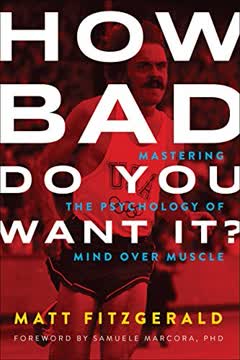
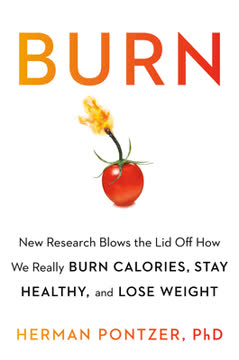
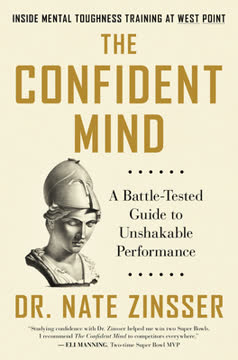
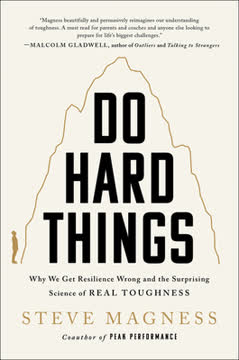


Download PDF
Download EPUB
.epub digital book format is ideal for reading ebooks on phones, tablets, and e-readers.
